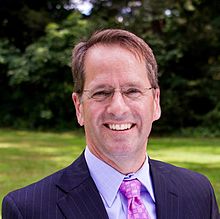After more than a dozen tries over the past 15 months, Education Commissioner Frank Edelblut will finally get his federal charter school grant approved on Friday. In the inaugural session of the Joint Legislative Fiscal Committee, the new Republican majority will vote to accept the grant, the largest of its kind in the nation.
Edelblut brought the grant request back to the committee repeatedly, month after month, since it was first approved by the federal Department of Education. And month after month, the Democratic majority would vote it down in one way or another.
“It will finally be approved,” Fiscal Committee Chairman Ken Weyler (R-Kingston) tells NHJournal.
“It should be a fairly short meeting. We’ve already discussed this issue at length multiple times over the previous year,” Weyler says.
“I would expect it would go through no problem,” state Sen. Gary Daniels (R-Milford) agreed. Daniels will serve on fiscal as chairman of the Senate Finance Committee.
The Department of Education is the only agency to request anything of fiscal for this meeting, according to the agenda. The teleconference style meeting will only otherwise include acceptance of the November minutes, and the organization of the committee for the upcoming biennium — the choosing of a vice chairman and a clerk.
Weyler, as chairman of the House Finance Committee, will serve as chairman as prescribed by law. Now entering his 17th term in the House, Weyler has served on the House Finance Committee for 22 years, many of those in leadership positions. Senator Daniels, the Chairman of the Senate Finance Committee, will serve as vice chairman — as is tradition.
Republicans, in accepting this grant money, will make good on their first campaign promise to expand educational opportunities.
“We need to focus on what this money can bring at-risk students in terms of opportunities,” Senator Daniels told NHJournal. “It’s a great thing that we can get this money from the federal government and help those students succeed educationally.”
The acceptance brings $10.1 million to New Hampshire initially, with $35 million left to be accepted over the next two bienniums, much of which will be incorporated into the upcoming budget. The Department of Education will utilize these funds to expand and open new charter schools across the state, replicating existing successful charter models.
“This program expands opportunities for all students, particularly traditionally underserved students,” the Department’s application says. The application lists that the top priority of the grant is to “increase, expand, or replicate the number of high-quality charter schools, especially those aiding at-risk, educationally disadvantaged students in rural and urban settings.”
Commissioner Edelblut is required by law to seek all existing and available grants from the federal Department of Education. In 2019, he applied for and received the largest charter school expansion grant in the country, totaling over $46 million. In a stunning move, the Democrat-led Fiscal Committee rejected it — more than one dozen times since October of 2019.
During a visit to New Hampshire in September, U.S. Education Secretary Betsy DeVos told NHJournal she didn’t know of any other state to reject these funds. And nobody can recall the state ever rejecting federal education funds in the past.
Democrats have argued that accepting federal grants for charter schools defunds public schools, claiming it could cost traditional district schools up to $17 million. In New Hampshire, all charter schools are public schools.
Rep. Lynne Ober (R-Hudson) attributes Democrat objections to funding disparities. “Democrats refuse to support charter schools because of the disparity between state support for regular public school students and charter public school students,” Ober tells NHJournal.
“The argument is that every public school pupil deserves the same amount of aid.”
Ober hopes Republicans will seize their opportunity with full control of the state to fix that problem before it’s too late. Some argue that failing to do so could eventually lead to an income tax to fund education.
“Hopefully, the Commissioner of Education can work with the legislature to develop a funding scheme that is equitable for all public school pupils,” says Ober.

